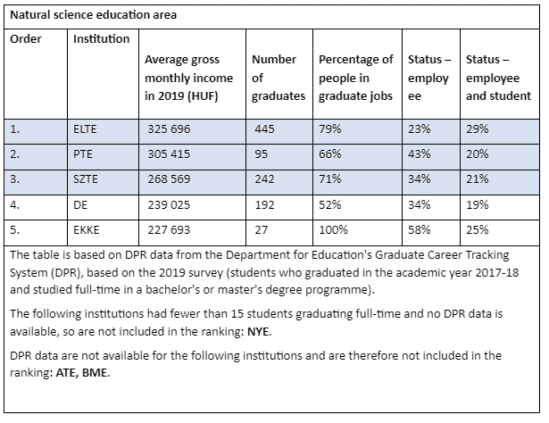Bachelor’s degree courses:
In the field of natural sciences, there are 8 bachelor’s degrees to choose from. Graduates can expect the highest average monthly gross salary in
in the 2019 survey. Depending on their field of study, students can choose between several higher education institutions, including those in the capital and in rural areas.

Average starting salary after graduation is taken as a ranking indicator.

The average gross monthly income of science graduates in the 2017/18 academic year (based on 2019 data) is close to HUF 290,000, but there are differences between institutions. Looking only at full-time students, the highest salary was for graduates of ELTE, with a monthly gross salary of HUF 326,000. In terms of average gross monthly income, PTE is in second place with HUF 305 thousand, while SZTE is in third place with almost HUF 269,000.
On average, 54 per cent of graduates with a bachelor’s degree in a field of study start working within 2.2 months of graduation. Nearly two thirds of graduates find a graduate job, the highest rates in the EKKE (100 per cent) and ELTE (79 per cent).
Around a quarter of graduates decide to continue their studies in employment after graduation, the highest rates in ELTE (29 per cent) and EKKE (25 per cent).
The average gross monthly income of ELTE graduates is HUF 326,000, which puts the institution at the top of our ranking of training areas in terms of the expected graduate salary after graduation. Within two months of graduation, graduates are already employed, with 79 per cent of them in graduate jobs. ELTE is the largest in the field of science (including in terms of the number of graduates), with 445 graduates in 2017-18. On average, ELTE students complete their bachelor’s degree in 7.7 active semesters.
The average gross monthly income of PTE graduates is HUF 305,000, which puts the university in second place in the ranking of training areas. On average, graduates are employed within 2.3 months of graduation, with 66 per cent of them finding a graduate job.
The average gross monthly income of SZTE graduates is close to HUF 269,000, making the institution the third best in its field. Graduates are in employment within about 2.2 months after graduation, and 71 per cent of them succeed in finding a graduate job. In the field of natural sciences, SZTE is one of the larger institutions, with 242 graduates in the 2017-18 academic year.
A low proportion of graduates with a bachelor’s degree in science, only 4 per cent, studied abroad (e.g. under Erasmus) during their studies. During their training (before graduation), around 40 per cent of students had a professional job and around 60 per cent a nonprofessional job.
After graduation, around 37 per cent of graduates settle and/or continue their studies in Budapest or County Pest . After completing their bachelor’s degree, they typically find employment in the private sector (72 per cent of graduates), 22 per cent in the public sector and around 6 per cent in non-profit or other employment.
The proportion of graduates in the field who are employed in the labour market is high (87 per cent). Overall, graduates in science are satisfied with their jobs (67 per cent), but this is lower than in other fields.